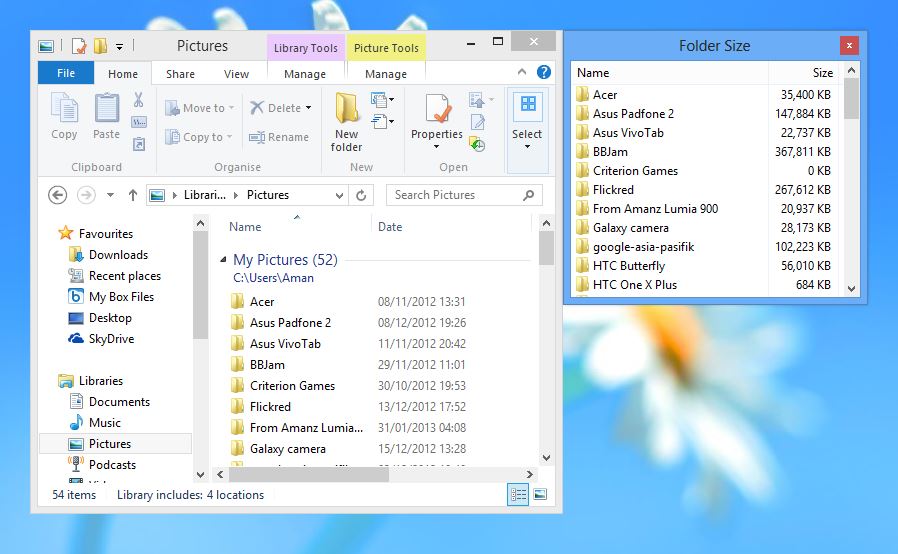
- #MUCOMMANDER CALCULATE FOLDER SIZE HOW TO#
- #MUCOMMANDER CALCULATE FOLDER SIZE ARCHIVE#
- #MUCOMMANDER CALCULATE FOLDER SIZE CODE#
- #MUCOMMANDER CALCULATE FOLDER SIZE DOWNLOAD#
- #MUCOMMANDER CALCULATE FOLDER SIZE MAC#
After done, click in 'repair disk permissions'. By following these steps folder size explorer. Tick the box beside the option 'Display file size information in folder tips' in the advanced settings dialog box. Go to Disk Utility, select your disk, and hit 'verify disk permissions'. Add a reference to the Microsoft Scripting Runtime and use: Scripting.FileSystemObject fso new Scripting.FileSystemObject () Scripting.Folder folder fso.GetFolder ( folder path) Int64 dirSize (Int64)folder.Size If you just need the size, this is much faster than recursing. Follow these steps for using Windows explorer to show folder size method: Go to File Explorer Options. PS 3: If you realize the spotlight is not searching how should be, it is a signal that above procedure should be executed. PS 2: Sorry, I do not remember where I learned it, but, in the worst case, you will lose a bit of time while OS X rebuilds the file indexes to improve spotlight search. Now, click in a disk you just added, and remove it (using the '-' button). I did it on my own, just to make sure).Īfter the reboot, go back to system 'System Preferences' -> 'Spotlight', then, 'Privacy'.
#MUCOMMANDER CALCULATE FOLDER SIZE MAC#
Reboot your Mac (when I learned about it, this step was not mentioned. Of course you can assign a custom hotkey like Ctrl+Something to perform one of these commands. A very missed feature comparing to Far Manager. If you are using a plugin like DirSizeCalc you can use the commands cmLoadSelOnDemandFields and cmLoadAllOnDemandFields to load all folder sizes or the size of each selected folder. So, to fix this, go to 'System Preferences' -> 'Spotlight', then, 'Privacy'.Ĭlick on the '+' button, and add the disk which contains the 'wrong sized folder'. Would be great if it calculated a directory size when the cursor is on one. The only matter is the problem may keep showing itself up.
#MUCOMMANDER CALCULATE FOLDER SIZE HOW TO#
So, I could not (yet) figure out why it happens, but, I could find out how to fix it. Many times I got the message 'Startup Disk is almost full'.įinder was showing 37 GB in that folder, but, checking each subfolder individually, the size of all was like 10 GB smaller.
#MUCOMMANDER CALCULATE FOLDER SIZE DOWNLOAD#
Interlocked.Add(ref _diskSize, WrapToClusterSize(fileInfo.Well, I had similar issue in my Download folder.
#MUCOMMANDER CALCULATE FOLDER SIZE CODE#
Private static extern bool GetDiskFreeSpace(Īnd of course you need to rewrite GetFileSize() in first code section: private long _diskSize Return sectorsPerCluster * bytesPerSector

Throw new Exception(string.Format("Error code ", lastError)) Var lastError = Marshal.GetLastWin32Error()

Satisfies rule CallGetLastErrorImmediatelyAfterPInvoke. If (!GetDiskFreeSpace(rootPath, ref sectorsPerCluster, ref bytesPerSector, ref numFreeClusters, Int sectorsPerCluster = 0, bytesPerSector = 0, numFreeClusters = 0, totalNumClusters = 0 Private static int GetClusterSize(string rootPath) Return ((originalSize + _clusterSize - 1) / _clusterSize) * _clusterSize Private long WrapToClusterSize(long originalSize) Btw if you need to calculate cluster size and real size on disk, you can do next: using This approach appeared for me as the best which I could find on. files quickly - whether they are 100 bytes or 100 gigabytes in size. Var fcount = new FileCounter("F:\\temp") The Best muCommander alternatives for Portable, from Dual pane support to a SSH. Interlocked.Add(ref _size, fileInfo.Length)
#MUCOMMANDER CALCULATE FOLDER SIZE ARCHIVE#
Private void GetFileSize(FileInfo fileInfo) Q-Dir is a file manager that will help you to intelligently organize and archive your various documents on. Parallel.ForEach(filesEnumerated, GetFileSize) EnumerateFiles("*", SearchOption.AllDirectories) Var filesEnumerated = new DirectoryInfo(rootPath) Enumerate files (without real execution of course) The fastest approach on 4.0-4.5 framework which I could find to calculate files size and their count on disk was: using System.IO

the dictionary value will be the folder size at c:\StartingFolder and including all subdirectories), and now folderSizes will contain a key for each directory (starting recurse on all the directories in current directoryįoreach (string d in Directory.GetDirectories(dirName))įolderSizes = new (string key in folderSizes.Keys)Ĭonsole.WriteLine("dirName = " + key + " dirSize = " + folderSizes) String a = Directory.GetFiles(dirName, "*.*") use memoization to keep from doing unnecessary work Public static long GetDirectorySize(string dirName) You can do something like this, but there's no fast=true setting when it comes to getting folder sizes, you have to add up the file sizes.


 0 kommentar(er)
0 kommentar(er)
